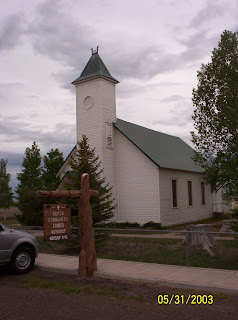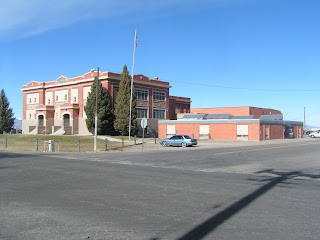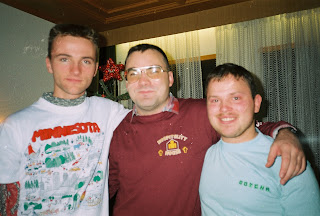Deconstruction of my Christianity - My theological Anthropology
This is my Theological Anthropology as written for one of my courses.
My theological anthropology is complex and brings up complicated emotions. I grew up in Southern Colorado initially on a farm south of Monte Vista. Growing up, Bowen Community United Methodist Church twelve miles south of Monte Vista represented my family's spiritual home, including paternal grandparents, and my father's older sister and family. After we lost both my grandparents and my family's farms shortly after my grandfather's death, we moved north of Monte Vista. We started to attend the Monte Vista United Methodist Church that shared the same minister as the Bowen Community UMC. I was ten when we moved, but we also shared the youth group since we shared the minister. I attended Sunday School, Vacation Bible School, and as a teenager, I served as an usher while both my parents sang in the choir.
At my new school, I fell into a group of friends who attended the local Southern Baptist Convention church, Calvary Baptist Church; one of my friend's parents started a weekly bible study for students in their home. During my 8thgrade year, I found myself at Calvary Baptist's revivals, where I became born again, accepting Jesus into my heart to become my Lord and Savior. This change started me on my evangelical path. I read the bible and tried to become more like Christ every day. Before my Junior year of high school, I wrote down my goals, which included becoming a minister two years after I finished college at Oral Roberts University.
The summer before my Junior year, my parents reminded me that there was no money for me to go to college, so I would have to earn a scholarship. Going to a rural high school with twenty-one graduates in my class, I needed to be first in my class, be involved in extracurricular activities, or earn an athletic scholarship. They also reminded me that by attending one of the service academies, the US government would pay for all of my college experience. With my academics, too numerous to mention extracurricular activities and ten varsity letters in athletics, I became the only graduate from my High School to attend a service academy. I also believed that God was leading me to become a Cadet at the United States Military Academy at West Point, as it felt miraculous that I could get a full-ride scholarship to such a prestigious school.
My theology continued to develop as a personal relationship with Jesus, where I tried to display his impact on my life through my word and deed. At West Point, I was very involved in the protestant community serving as a Sunday School teacher, Officer Christian Fellowship, and as Co-Chairman of the Vida Neuva (http://mhvn.org/vnhistory.html) retreat council, which I used to proselytize to my faith, converting two of my roommates. I was an office 'rat' (someone who spent a lot of time in the Protestant Chaplain's office), as I spent most every weekday morning, when not in class in the office. I went there primarily to avoid any weekday morning inspections but also to socialize and study. During my interactions in the Chaplain's office, I learned about what the bible had to say about homosexuality.
Growing up in rural Colorado in the 1970s and 1980s without any examples or understanding of what being gay meant, I knew I was different. Still, I did not understand why I was different. Sexual education did not mention homosexuality when taught in 5th grade at the rural Sargent Elementary school in the late 1970s. I dated females in High School, but they did not sexually attract me. I assumed that it was because God was helping me keep my sexual purity. It is surprisingly easy to not act on your hormones with a person of the opposite sex as a gay male when you are publicly declaring that you are not having sex before you are married due to your Evangelical Christian faith.
Without the understanding of why I was different, events occurred where I acted out inappropriately. It is clear that I was trying to understand, but had no framework or context where I could explore the intense feelings and emotions I was experiencing. The leaders and authorities around me, my parents, coaches, teachers, and minister (all of whom were Christians, including the majority evangelical) also had no framework or context for understanding my actions. While I repented for my actions, there was no guidance on dealing with the attractions I had for other males other than those feelings were "undesirable." I learned to repress those feelings and prayed for deliverance from those feelings.
So it was in the West Point Protestant Chaplain's office that found out the reason for the negative association between Christianity and homosexuality. The extent of the negative teaching and interpretation of homosexuality in the three Abrahamic faiths on Western theology, law, and culture is immense. This discovery was also nine years before the Don't Ask Don't Tell policy, so admitting that I am a gay would result in immediate dismissal from the military, loss of a means to pay for college, humiliation, and degradation when arriving home. There was no one I could talk too about this "problem," so I prayed and read my bible, asking God to heal me and take away these attractions. I was so confident that God had to lead me in this direction, and I trusted him fully. I managed to graduate and become an Armor Officer stationed in Germany.
While serving in Germany, I found the local Hospitality House, a ministry through the Officer's Christian Fellowship. The House is run by Christian missionary families who open the house to servicemembers for bible study and fellowship a couple of times per week. I was a regular, encouraged my soldiers to attend, and was a leader within the house. My struggle with my sexuality continued, and even though this was the late 1980s, and the HIV epidemic was raging, I repeatedly had unprotected gay sex. I continued to ask God with help and for healing. In my last year of Germany, Saddam Hussein's Iraq invaded Kuwait, and in the build-up for war, my transfer back to the US stopped. Later I volunteered to fill a position in another unit. I started and lead a bible study before combat operations began and did my best to fulfill my role. After the ceasefire, my unit located in a bunker for an oil refinery in Iraq, I broke down and told someone I was gay and having a difficult time. The person promised me he would not tell anyone. Still, a couple of months later Criminal Investigation Division started asking questions. I was quickly forced to resign my commission and received an Other Than Honorable Discharge (no veterans benefits). I wanted to kill myself. I arrived back in Germany as a psychiatric patient, where for the first time in my life, a doctor told me that being gay was natural and that I should accept it. Believing it violated my faith, I fought. I joined an ex-gay group, spent six months in a deep depression, and hoped I could do all things through Jesus (Phil 4:13).
At the age of 27 had to start rebuilding my life and my understanding of reality. Even though I still believed and sought his guidance, I was angry at God for creating me with my attraction to men. His demanding that I either ignore my attraction and accept a life of physical and emotional isolation or, more importantly, try to change a fundamental part of who I am. I blamed him for his failure to answer my and other's prayers and guidance. This questioning was the starting point in allowing me to examine the claims of the bible through a critical eye. For many years I continued to call myself Christian while still investigating what the bible taught. I also wanted to remain spiritual, so I examined other faith traditions, but none of them were any better. It took many years to accept being gay and lose the shame associated with the Christian teaching I knew growing up. I determined that it was not just the teaching that I grew up with, but the Christian worldview's entire concept has no evidence in reality.
Eventually, I saw everything I did to go to West Point, become an Army officer, get a master's degree in computer science, and rebuild my life was not supernatural, but the result of my hard work. I found such freedom and lightness in my life. This determination happened six years ago when I started listening to atheist podcasts and realized I am an atheist. I no longer believed that the supernatural exists, nor is there a justification for that belief. I found that atheism only answers one question, is there enough evidence to believe in any deity. The answer is no; after building my entire life around the Christian worldview, I began to search for something positive that could help me to become a better human being in the short time that I have on this earth. That is when I found Humanism. Between the Humanist Manifesto and the ten commitments (critical thinking, ethical development, peace & social justice, service & participation, empathy, humility, environmentalism, global awareness, responsibility, and altruism “Living Humanist Values: The Ten Commitments.” TheHumanist.com, August 27, 2019. ), I found a moral and ethical foundation on which to live my life.








Comments
Post a Comment